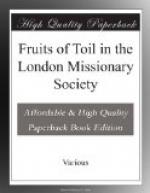From the ample information recently furnished by the missionaries to the Directors, we learn that these two colonies of the British Crown contain together a population of Negro extraction amounting to half a million individuals; viz.: British Guiana, 100,000; Jamaica, 400,000. Besides these there are Indian Coolies, 28,800 in number, of whom Guiana has 25,000. That province also contains 7,000 Indians, while Jamaica has its thousands of heathen Maroons. The ruling population of whites is 13,816 in Jamaica, and 2,000 in Guiana, or about 16,000 in all. This native population of half a million, just equal in number to the population of the single city of Calcutta or Canton, spread over an occupied territory of twelve thousand square miles, and situated only four thousand miles from England, enjoys the services of three hundred professed ministers of the Gospel; of whom a hundred and forty are supplied by Missionary Societies not connected with the established churches and supported by voluntary funds. The bulk of the population is nominally Christian, and has been for some years as well instructed in Christianity as an equal number of persons in the country parts of England. And doubtless it has been thus christianized the more fully because of the large supply of religious teachers furnished by the different sections of the Church of Christ.
It is evident that the converts in Jamaica occupy a much higher position of physical and social comfort than those in Guiana, and that the latter are not so well off as they were five-and-twenty years ago. While wages have fallen and prices have increased, it is evident that the moral influence of the 25,000 Coolies from India, with all their heathen vices, on the 100,000 Creoles has been exceedingly injurious. In neither colony has there been that thorough spiritual growth, that self-control, that self-reliance among the christian converts generally, which their best friends hoped for and thought they were able to find. This cannot be deemed unnatural, when it is considered that only thirty years have passed since the Act of Emancipation, and that ages of training will be needed before the moral taint of slavery is purified away.
[Illustration: RIDGEMOUNT, Jamaica.]
The Directors therefore feel that it would be in every way a mistake to throw these young and imperfect churches at once upon their own resources. They have also not seriously entertained the suggestion made to commend them to the care of some other evangelical denomination seeking the same end as ourselves. Nevertheless the Board cannot think it right or wise to continue the present system unchanged. If unable completely to run alone, our churches are too large, the members too numerous, and their resources too great to justify any continuance of that complete dependence upon the Society which has prevailed with them hitherto. The Board desire to see the churches strong in themselves, managing completely their own affairs, providing the ministry by which they shall be instructed, and engaged heartily in missionary efforts for the conversion of their heathen neighbours. This is the end which, they trust, will henceforth be distinctly kept in view, and which should be sought by every means which practical experience finds suitable to promote it.




